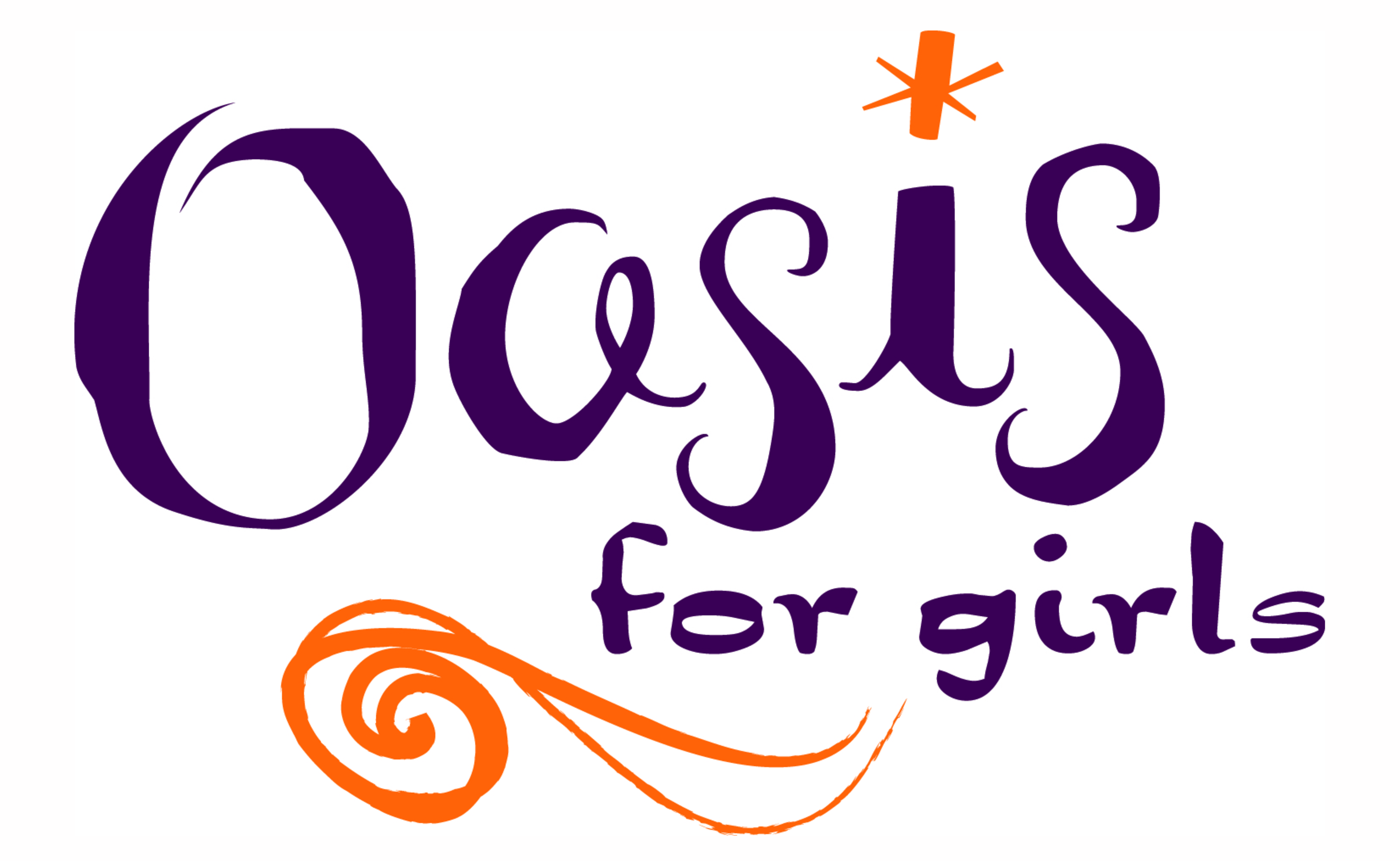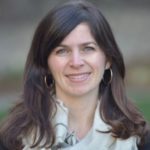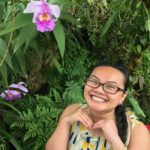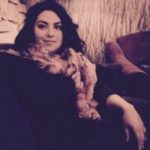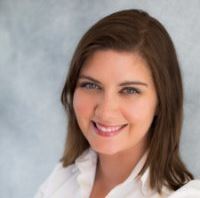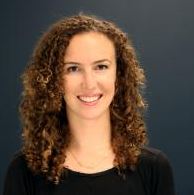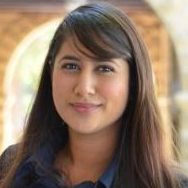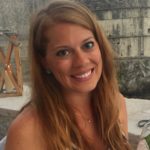Our Girls
Oasis for Girls has the privilege of getting to work with young women aged 14-18, attending public high schools and living in under-resourced neighborhoods in San Francisco. At Oasis, they learn tools and skills to be strong, confident women finding their own definition of success and taking charge of their academic, professional, and personal futures.
Oasis girls draw strength from diverse experiences and backgrounds, and break cycles of disempowerment and inequality in their communities while in program and long after.
Featured Stories
Hi, we’re Tashina and Rayna Mims!!
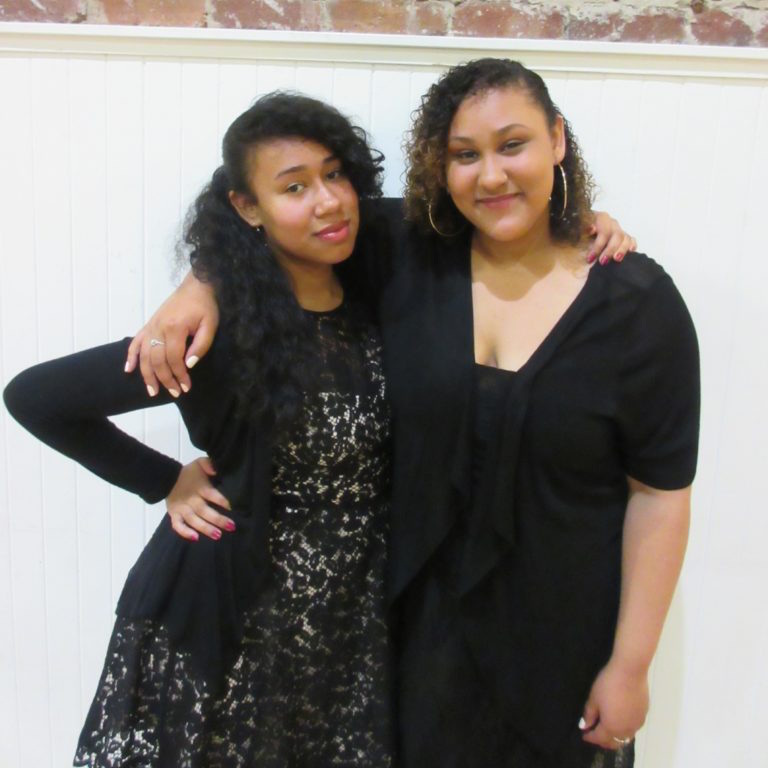
Oasis is the first time we’re doing something together like this, and learning different parts of being young women is really fun!
Tashina: I’ve already done two programs, RISE and ENVISION. I joined Oasis because my best friend had already done it and was always talking about the people she met here and the stuff she was learning. It was actually really exciting to have Rayna here this time around because she got to share a part of the awesome experience I had in RISE. After every day, she’d come tell me about the friends she made and the fun activities, which made me really happy.
Rayna: This is my first program, and I started with RISE. Tashina talked a lot about the women’s rights things she was learning in RISE, so that got me really interested. At first I was a little reluctant because it’s a lot of work and it’s summer, after all, but the way each day is planned, you don’t even realize how hard you’ve been working because it’s so much fun.
We talk about a lot of personal things in program, and it helped us open up more. Program policy doesn’t allow for fighting or catty behavior, so you have a group of girls your own age with similar experiences, and it’s a really safe, supportive environment that helps you grow.
Tashina: I feel like I got to know myself better at Oasis because I had a place that made me think about what I wanted and how I feel as a growing woman. I made so many new friends from all around the city, and we stay in touch even outside of program. The staff is also really helpful, and they make it ok to talk to them whenever you need to. Most importantly, I learned how to speak up for myself and actually use some of the skills that will help me now and later, like getting a resume together, knowing how to defend myself, how to behave in a workplace.
Rayna: I learned a lot of stuff I didn’t know about, and other stuff I was like, “Oh, I know what that is, I’ve seen that happen.” Especially with sexual assault and harassment; all girls know to stay aware when you’re traveling alone, but we actually learned how to do it properly, and also self defense. I didn’t know there were different kinds, either. A lot of girls shared similar struggles that I’ve had, so nobody feels alone, and it’s important to be able to process some things properly. A lot of girls don’t really have that opportunity. Everything was tied to a bigger idea, even when we went to the farmer’s market we learned about different food options, budgets, and nutrition. Even my mom didn’t know some of the things we learned!
A lot of us have really strong women in our lives, so sisterhood is important in our personal lives, but it should also be something we take with us outside too. At home, it’s just us and our mom, it’s always been just us three. It also helped us understand some stuff that we see every day as girls growing up here in the city, and that if women act together, we can make things better for all of us.
Tashina: Sisterhood is about respecting each other and keeping all the nonsense outside. You’re supposed to help each other grow, even when it’s not easy. That’s the important thing about sisterhood: you can clash and that’s ok, but you have to learn something from it.
Rayna: Girls should support girls no matter what, but it doesn’t always work that way. Sure, guys do a lot of stuff, but girls bully girls too. If we accepted and stood up for each other like sisters are supposed to in good times and bad, that would make such a huge difference. That’s the most important thing.
Oasis helps build that sisterhood from the inside out. You can’t be a good sister if you’re not ok with sharing about yourself and growing too. Life is going to be constantly throwing you things that you have to deal with, and it’s good to be adaptable and have a support network.
Tashina: A lot of the girls are shy and not very comfortable at the beginning of program. I was! But that’s what you’re here to do, learn about yourselves, each other, and what it means to be a modern woman. It’s nice to have smaller groups so you can have a sense of familiarity and start trusting people. The staff tell you right away that everyone has to be honest in order for this to be a safe space.
Rayna: Oasis gets you to open up about stuff you wouldn’t normally talk about. If people are being open with you, you want to give the same respect back. It feels good to openly say things you always wanted to but never had the chance to, and it lets other girls relate to you and have better friendships. When everyone is open, they’re not afraid to be themselves and be silly or brave or vulnerable. It’s a responsibility to make sure everyone can feel that way.
Learning about the stuff women have to deal with, we appreciated what our mom does for us more. Mom used to be a pharmacy tech for ten years, but she’s currently unemployed while she finishes school to become a pharmacist. She’s always worked hard to do the best for us.
Tashina: We’ve had days when we had no food in the house, and we had to lean on my grandmother for food and share what little we had. Since I babysit, I’m the only one with a steady income right now, and at times they rely on me for money for groceries. This is another thing that you’re not supposed to talk about, I guess. But when I came to Oasis, I was stressed and I just let it all out. A lot of girls actually were in similar situations or could sympathize, and it was such a relief to just be supported and talk. It can be stressful, but it’s what you do for family, to make sure everyone has what they need.
Rayna: Grandma grew up in a foster home and dreamed of coming to California, and our mom grew up here. It’s really amazing to be able to share our experiences with her as we grow up.
Everyone calls us the “deep sisters” because we always talk about things that are emotional or that people “don’t talk about”. Sometimes in the school hallway, we’ll hear racist or degrading comments and just start talking about why it started and who does it. People look at us and you can tell they’re uncomfortable…but also that they’re listening. We always try to make you feel comfortable, include you in our conversations and respect your opinions. Some people just get scared and didn’t know how to answer, though. But nothing can change if you don’t talk about it! We’re also really different in some ways, and that’s good, because we help each other and have different perspectives.
Tashina: Rayna’s a very strong person, really loyal and kind to the people she thinks deserve it. She’s very honest and blunt though, so she’ll call you right out if you’re being weird! I try to be direct like her, but it doesn’t always work.
Rayna: Tashina’s always really nice to everyone. Like, she’ll do things for people that they wouldn’t do for her. I admire that sometimes, because it takes me a while to open up.
Growing up in San Francisco, sexual harassment and self-image are two issues girls face that they need more support on.
Tashina: Girls are always trying to be something they think other people will like, when in reality they just need to be someone THEY like. We get so caught up in our image that we miss out on other things that make us more compassionate and confident when we’re older. We might look different from other girls at school, from our mom or sister, or from what “people” think is pretty at the time. When we can’t find makeup for our skin, or clothes that fit us, or if we can’t afford all those things that we’re told we “need”, these all make us feel worse. But who needs them! Confidence and kindness are better than the cutest jeans and the best lipstick.
Rayna: I always see sexual harassment happening almost casually when I walk anywhere. Girls need to be aware that it’s not okay, but also that it’s not about anything that they’re doing. Girls should be able to feel safe. Since we’re young women, we’re targeted, and people think we’re weak and can’t handle ourselves. We really need to change these cultural assumptions.
Oasis has helped us plan for our future by giving us a heads up about what to expect when we enter the workforce or apply for colleges. Native Americans are still an oppressed race, a lot of people hold on to old hate or have stereotypes. Plus, we’re women; we’re way stronger than men, but in men’s eyes we’re lower. All these things get more and more apparent as you get older. We know we’re going to have to work a lot harder than other people.
Tashina: I want to graduate college with as little debt as possible and work in the medical field because I really enjoy working with people in a hands-on way. Oasis has also taught me what I need to be aware of like rent, scholarships, and kinds of colleges, but also how to take pride in who I am and speak up for myself, for women, and for my people. I used to see myself really negatively and ignore my problems, but now I’m more self-confident. That’s the thing with Oasis, you have to put in the work, but you feel the change way after you’ve left program.
Rayna: Oasis helped me open up more; I was really angry and frustrated with things when I got here, but just having this safe space and supportive sisters helped me bloom socially. Now I know what I need for myself and what kinds of people I want around me. Nothing about what’s bothering me at any given minute is unique, you know? I met girls and even professional women who had gone through the same stuff. Just getting to know what’s out there was so cool, and I’m starting to plan to do something in computer science and aiming for things in the future.
Hi, we’re Zuri and Melissa Arellano!
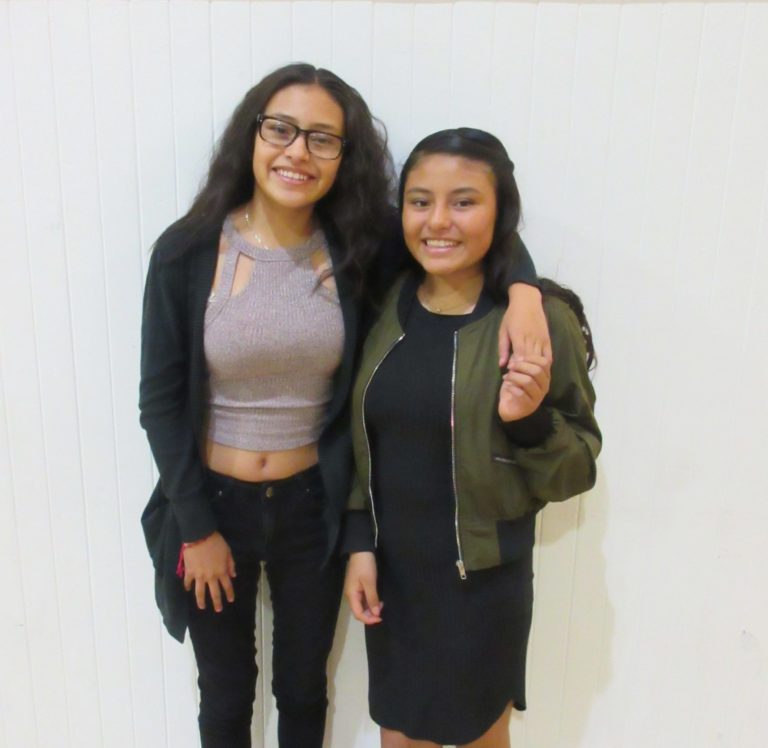
We started at Oasis at the same time, but Zuri heard about it first.
Zuri: I didn’t want to be stuck at home, and meeting new people and doing something after school just for girls sounded fun. Melissa came along because she always tries to copy me.
Melissa: No, I did it because someone else said it was cool. And I really wanted a new phone!
We didn’t really know what to expect, but we both felt really good after our first program, even though we were in different ones. Everything about Oasis is girly—not like unicorns and sparkles girly, more like a safe space for us—so you can ask questions, share stories, and explore things in really new ways.
Melissa: I learned more about myself and started to feel more confident. As a teenager, you don’t always look like the ads around the mall, can’t always afford to shop the newest trends, and your body is changing too. Sometimes you can feel embarrassed about your body. But you’re still pretty, and there’s more to beauty than what “everyone” thinks.
Zuri: Yeah, we definitely were encouraged to think positively about ourselves and question the “everyone thinks/says” stuff. All the girls could relate to the stuff we learned.
We’ve both done RISE and ENVISION so far. ENVISION taught us both about the future we could have, visiting colleges and learning about different careers. RISE was really a deep experience for both of us, learning about the things that girls have in common.
Zuri: I’m older, so ENVISION was really important because I’m thinking about college and work. The programs are super cool because they give you options and the coordinators are really helpful outside of class too, if you just want to talk or need help with scholarship applications or resumes. Like, I don’t have to be an engineer to be successful, and nobody at Oasis said so. ENVISION actually helped me start thinking seriously about fashion design. We visited schools for that and met people who actually do it. I saw that one girl took a year to travel around the world after high school though, so now I want to do that too.
Melissa: It was cool to start thinking about what I think is important to me for my future, and the whole college thing is new. Our parents want us to go, but they can’t help us so much with the whole process, so it’s good to know that Zuri and the program staff will be there when I’m ready. RISE was more interesting for me, it pushed me to think more about my ethnicity, different kinds of discrimination, and sexual harassment.
Zuri: Us girls see and go through a lot we don’t really have a name for. In RISE, we found out what they were and how things fit together in systems of discrimination. They talk about it sometimes in school, but there are boys and they’re childish or mean, so girls are embarrassed to speak up. Here, we all were encouraged to talk about things we’ve been through and ask questions we wanted knowing that we were in a safe place.
Oasis is a big sisterhood. We’re all girls and we go through the same things. Sisterhood is a simple thing, just caring, helping, and accepting each other. But it can be so, so hard in the real world where women can’t accept or respect each other. At Oasis, judgment is not okay, and we’re all young! Seeing someone go through a heartbreak or bonding over other stuff, you realize that nobody is really that different, and it’s easy to stand with them no matter what.
Zuri: It’s a little awkward the first week when all the girls are new, but then when you come into the lounge, everyone starts eating and laughing and talking together. You walk in and you see all these girls happy to see you!
Melissa: In program, they teach us to be respectful, and they really let us be honest and open with our feelings and when we need help.
We’re really close, people even say we look alike! Our mom taught us since we were little to stick together. We’re both different, but we know that we’ve got each other’s back no matter what and love each other dee down. It was fun to do the programs together because we can catch the bus home after.
Zuri: At first, I didn’t want her to come, honestly, because I wanted to experience it by myself. But we were in different classes, so we both learned different things. Sometimes I have my sisterly “do this” or “do that” hat on a lot with Meli, so it was good to not be distracted by that and her constant talking.
Melissa: I’m kind of glad we weren’t in the same class, because I think it let us grow individually, but still be able to share this cool experience of being at Oasis. I’m loud and don’t take anything seriously. Zuri’s the one who gives good advice, and I tell her to have more attitude.
Discrimination and harassment are some of the most important issues girls face in SF. People judge girls all the time. Guys do it, girls do it, we do it with ourselves.
Zuri: It’s like everything is open to judgment. The way girls dress, or how they look or talk, even their ethnicity. Because you know, girls are only supposed to look or be certain ways. It happens everywhere, in schools, buses, even movie theaters.
Melissa: Random guys stare at you so bad every time you go on the street. They know they’re making you uncomfortable, but they touch you or whistle. Like, we’re not dogs. But then we’re taught not to say anything, not to wear certain things, not to walk certain places, as if we’re the problem.
The most important thing Oasis taught us was to be more supportive of other girls. Life is harder for women, we’re going to face a lot of things and have to fight for basic stuff all the time. But now we know how what’s okay and what’s not, and what to do about it. Also that messing up is okay, and learning how to just do me but better. There will always be a supportive group of Oasis sisters and others, and finding those bonds wherever we go will help make our own lives and communities better.
Hi, we’re Sadaf and Saman Minapara!
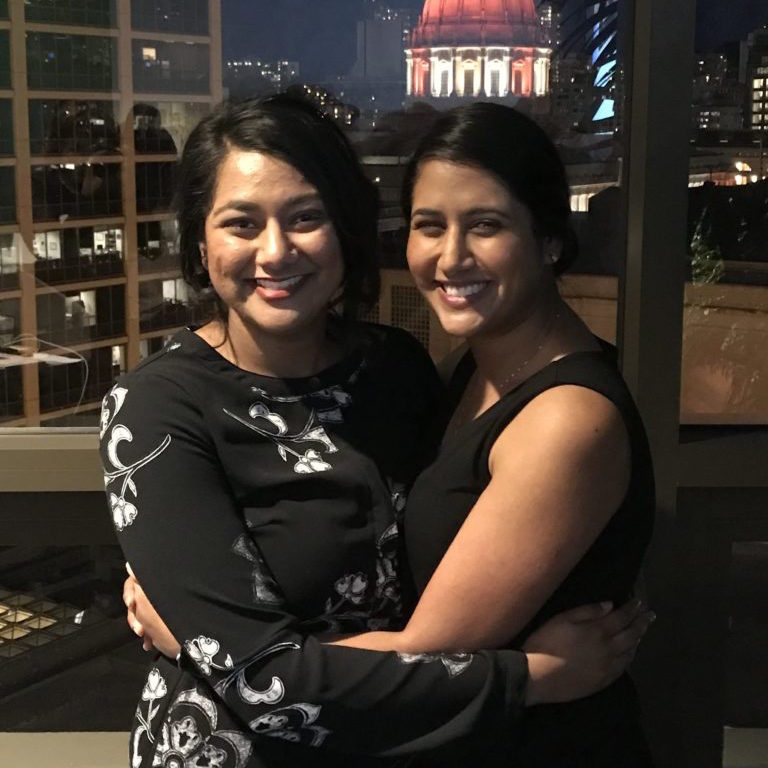
Oasis changes all the time because it responds to girls’ needs, as it did between our times in program, but for all the girls we know, it was first and foremost a physical and emotional space where we could just be us first. You don’t really think about how gendered daily life can be for teen girls, but making that distinction and having that space gave us a head start as young women. By giving us a forum to talk about important issues affecting women that were not discussed in our communities, Oasis provided us with the tools to have our voices heard.
Sadaf: I was part of the original Oasis For Girls cohort when it was just the founders, Ly and Jill, and a few girls in a basement of an apartment building in SOMA. Every Friday, we’d have girls’ night, and that was the first Oasis program, really, just a place for us to get together, talk about any challenges or questions we had that we weren’t comfortable asking at home.
Saman: They had the RISE and ENVISION programs by the time I came along–younger sibling privilege. The things that Sadaf had enjoyed, like positive body image, career exploration, discussion of women’s rights, and appreciation for each others’ cultures were all articulated more clearly.
Growing up in an immigrant family with its own cultural values on one hand, and being a young adult in a city like San Francisco on the other, there was a lot of confusion generally and especially about what normal teen girls worry about.
Sadaf: It was the first time I had role models outside my family who were cool and independent women but still could understand where I was coming from. Ly and Jill showed me the importance of being self-confident and make the right decisions for myself. It sparked a drive that stayed with me throughout college and informs what I do in my working life. It impacted me so much that I came back to be on Oasis’ board! I hope I can be that role model for other young women growing up with similar backgrounds and questions.
Saman: It was different for me because Sadaf had done everything first, and I could ask her most of my awkward questions. Still, having frank discussions on healthy body image and hands-on workshops like self-defense were personally very valuable for me. The identities that Oasis girls represent could potentially be contradictory, but in the space, everyone is equal, accepted, and able to be themselves without all the labels. The staff emphasize our similarities as young women–we can all related to certain things that seem to only happen to teen girls–and from there it’s easy to explore the different experiences we have with open minds.
Sometimes, success for girls can become a one size fits all prescription, but Oasis kept saying, “Okay, this is what you could do, but you’re also good at this. What’s important to you? Can you find a balance?” Nobody had asked us that before. It was empowering to know that we could really set our own paths and know how to do it.
Sadaf: I double majored in Political Science and South and Southeast Asian Studies at UC Berkeley, and went right into the nonprofit world, even living in New Delhi for a year. Oasis brought me out of my shell and taught me the importance of community and doing something you love. By day, I’m a Program Manager at Stanford University’s Center on Democracy, Development, and Rule of Law, but in the very early mornings, I’m at the flower markets for my own florist business, Baynisa Blooms!
Saman: I wanted to be a news reporter! I thought the weather person was really cool. But Oasis made me think about certain things more critically as a young woman of color, and I wanted to pay it forward and be in the thick of change. I’m currently in my second year of law school at Santa Clara University, focusing on immigration and human rights law. At Oasis, we were encouraged to be more confident and ask for what was fair, but the vast majority of women even in San Francisco put or find themselves coming second, or don’t know where to find resources for help if they need it.
Our relationship with each other has grown over the years as we have and continue to go through different stages in our lives. Sadaf is (a lot) (excuse me, just a few years) older, so as we grew up and had different life experiences, it was awesome to have Oasis as a common lens and bonding point. Besides each other, we both have a close sisterhood of Oasis girls from our time there whom we’re still close to today.
Saman: Sisterhood is a beacon, people you can always look up to and who look out for you, not just in your family, but also in the communities you move through. Four of us were at Oasis at the same time and lived in SOMA, which got us dubbed “the SOMA four”. We’ve grown up, gone to college, lived abroad, been in each others’ weddings, had babies, and we’re still just a text away.
Sadaf: Sisterhood is home, a safe emotional space where you can turn to in moments of happiness, boredom, or hardship. It’s important to be heard and talk things out without judgment and alternative feedback, and have that base as we take on more responsibilities and face new challenges. I still live in San Francisco and hang out with my Oasis girls regularly- a few of us just got back from an impromptu trip to Malaysia!
The Women’s March in January 2017 was the largest single-day demonstration in US history, and sent a very clear message that women’s rights are human rights–again. It’s something we keep having to repeat and defend, and it was especially wonderful to see women of color coming to the forefront of the movement. But at the same time, the current climate makes just being a woman of color, never mind an immigrant or low-income worker, incredibly risky. Oasis’ programs and presence will be increasingly more important for empowering young women who will be driving their communities forward and providing them with a safe emotional and physical space to be confident, healthy leaders.
Raquel - #OasisShero!
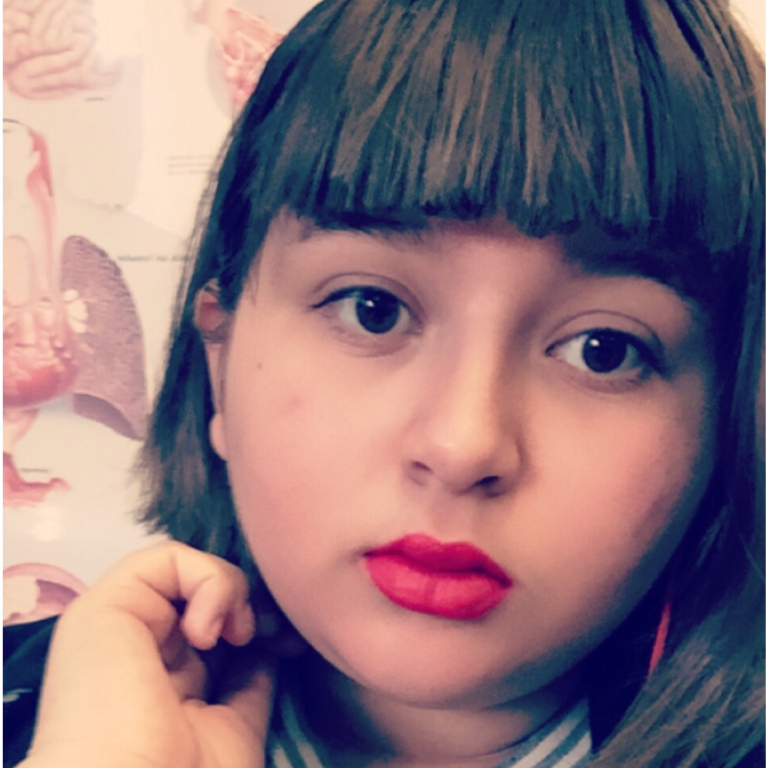
In May 2017, we launched our #OasisSheroes campaign, honoring our Oasis girls who have gone above and beyond for themselves, their families, and their communities.
Just a few weeks ago, we shared Mariana’s story of campaigning her school for greater tolerance and since then, I’ve sat down to interview another one of our #OasisSheroes, Raquel. I’m excited to share our conversation with you today…
Raquel is a sophomore, attends Mission High School, and lives with her Mom and step Dad in South Beach.
Jessica: Can you tell me a little bit about your time at Oasis?
Raquel: Oasis helped me a lot! It not only gave me stuff to do after school that was positive, but I made good friends and I’m a lot happier now. When I came to Oasis, I was so surprised to meet other young women who had been through similar experiences and they have helped me get through hard things in my life. I have met people who I know I can always go to when I face challenges and even after Oasis, we’ll support each other.
Jessica: What have you learned at Oasis?
Raquel: Oasis has taught me how to be a leader. I am shy and have always been uncomfortable leading things, but Oasis helped me develop a vision and now, I feel comfortable taking charge. I use to hate public speaking, but through the activities we’ve done at Oasis, I’ve gotten good at it!
Jessica: How have you used your new leadership skills?
Raquel: This year, I became the President of the Queer Student Alliance at my school! At first, I didn’t want to do it because it seemed like a lot of pressure. But the skills I learned at Oasis helped take the pressure off because I knew how to lead the group!
Jessica: What kind of leader are you?
Raquel: In the beginning, I really wanted to please everyone so it was really hard. But now, I realize its my job to listen to everyone’s ideas and help decide the best way to move forward. Ultimately, I learned that the job of being a leader isn’t necessarily to be liked, but to get stuff done!
Jessica: How have you made a difference?
Raquel: We just won a long battle to get a gender neutral bathroom at my school. It took a lot of education about gender neutrality, what gender is, and why its important to have a restroom where everyone can feel comfortable, but we won!
Jessica: What do you see for your future?
Raquel: Before Oasis, I wanted to be a heart surgeon. But then I went on a tour of an arts college with the ENVISION program and now, I think I would like to go to arts school. As soon as I stepped in there, I felt like I fit in with my paint splattered jacket and choppy blue hair. People always praise me for my art, but I hadn’t really considered it as a career!
We’re incredibly proud of Raquel’s accomplishments and we can’t wait to see what her future will bring!
Please join us today in supporting the next generation of female leaders like Raquel with a donation to Oasis For Girls, and use #OasisSheroes to share your story on social media today.
Thank you for honoring our #OasisSheroes!
Halliana - #OasisShero!
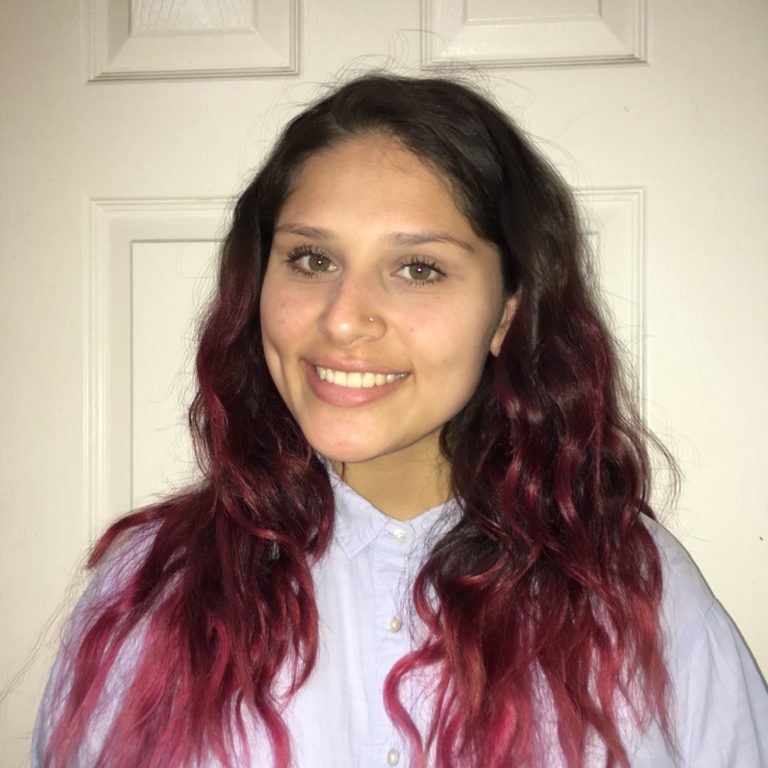
Just three days left in our #OasisSheroes campaign! We're honoring Oasis trailblazers who are transforming their own lives, as well as paving a path for women and girls into the future!
Today, I am proud to share my interview with Halliana, one of our #OasisSheroes, who just completed our ENVISION Career Exploration Program this Spring!
Halliana is a junior at Burton High School and she lives with her Mom and two siblings in San Francisco’s Excelsior neighborhood.
Jessica: Why did you decide to join Oasis?
Halliana: I kept staying after school to avoid going home, but I didn’t want to participate in anything because I was afraid it wouldn’t impact me. One of my friends was applying to Oasis, so I joined with her. At Oasis, I met other young women, we talked about our lives, and I realized I could actually trust people!
Jessica: What did you learn at Oasis?
Halliana: Oasis has helped me broaden my perspective, showing me everything that is available to me as a young woman. I met professional women who are working in careers I never knew existed and they have helped me to realize that I can do anything!
I use to be shy, but Oasis has also encouraged me to embrace who I am. I would have never talked in front of people, but I had to speak at Oasis Graduation. I was really anxious, but all of the girls supported me and I realized I had to do it for them. I wanted to show them that they meant something to me!
Jessica: How do you use your voice now?
Halliana: Oasis motivated me to get more involved in my community, so I joined Peer Resources at my school. We learned about the impact of gentrification on our schools in preparation for Youth Activism Day where we made recommendations to the school board. I told the school board to invest in keeping our schools diverse because I believe that diversity in schools is really important because it helps us to learn and grow.
Jessica: How has being an activist changed you?
Halliana: Oasis has really empowered me connect with other people, find common ground, and take action. I’m not scared to try new things or make my voice heard. I speak up…and people listen!
Jessica: What do you want to do with your future?
Halliana: I’m not sure, but my number one priority is to go to college!
If you are as impressed as I am by Halliana’s story, please join us to today in supporting other #OasisSheroes just like her by making a donation to Oasis For Girls! Please use #OasisSheroes to share your story on social media today!
Thank you for supporting our #OasisSheroes!
Irma - #OasisShero!
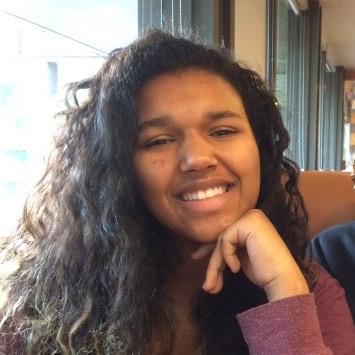
Irma is a senior at School of the Arts and lives with her mother and sisters in the BayView Hunters Point neighborhood.
Jessica: So tell me why you came to Oasis For Girls?
Irma: Right before I started at Oasis, I was in a dark place because I had just transferred to a new school. My old school was full of people of color who looked like me and talked like me, but in my new school, no one looked like me or talked like me. I had trouble making friends, but once I finally did, I fell in with the wrong crowd- they were using drugs, skipping school, and shoplifting. I was really sad and depressed.
Jessica: What kind of experience did you have at Oasis For Girls?
Irma: I felt welcome right away- I met girls who looked like me and talked like me. I felt really happy because I could just be myself without being judged.
In my home, there are really strong rules about how women and men are supposed to behave and I thought I had to follow them. In RISE, I realized that I didn’t have to follow these rules, but that I could be myself and speak my mind. In CREATE, I learned how to free write to get my feelings out. Initially, I didn’t like it, but now I do it every day because it helps me problem solve! I didn’t really want to go to college because I didn’t think it was for me- I thought I would move to Los Angeles to get an acting job. But in ENVISION I learned that I could go abroad for college through a scholarship!
Jessica: How has Oasis changed your perspective?
Irma: Oasis has helped me see the rules and concepts that society makes that aren’t necessarily real. Oasis has led me to question: Am I doing this because its something that I have to do? Or is it something that society wants me to do? Oasis has opened my eyes to the problems in the world and how I can solve them.
Jessica: What problems would you like to solve?
Irma: At my school, about 50% of the student population identifies as lesbian, gay, bisexual, transgender, queer, or questioning (LGBTQ). I have learned about their stories and why they need allies- so I’ve decided to support them! This year, I am the President of the Gay Straight Alliance and its my job to listen to people, educate myself, and help people get their stories out there!
Jessica: What are your plans for the future?
Irma: I am so excited- I was just accepted to study drama applied theater in London for Fall 2016! Through my studies, I’m hoping to help the audience understand something they didn’t understand before- the experience of being an LGBTQ person. I feel like I can make a difference in the world!
Mariana - #OasisShero
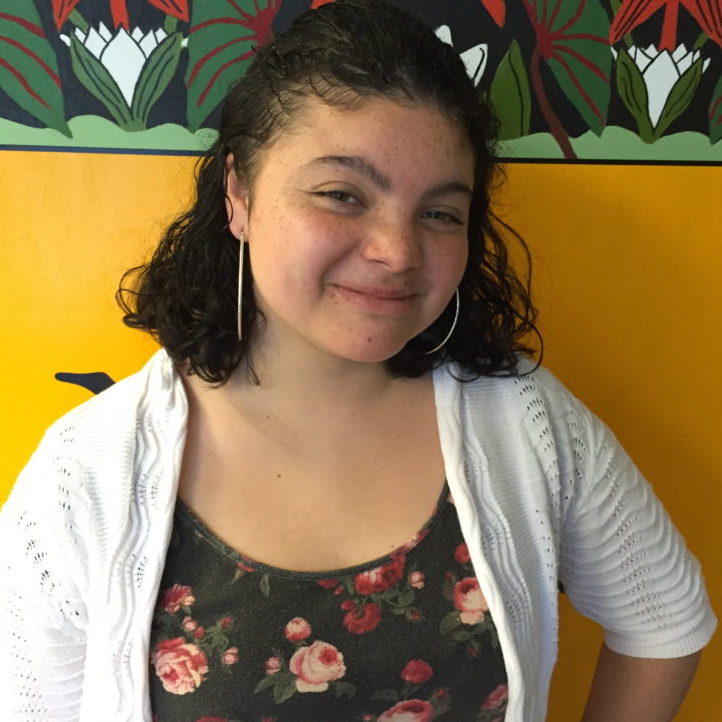
Meet our #OasisSheroes!
Last month we celebrated Women’s History Month at Oasis For Girls, honoring brave women of color who have transformed history and paved the path for today’s women and girls. But at Oasis, we don’t just teach our girls about their foremothers, we partner with them to help them discover their innate leadership potential and empower them to become part of the next generation of female changemakers.
Today, we would love to share Mariana’s story with you- one of our #OasisSheroes who goes above and beyond for herself, her family, and her community.
Mariana is Mexican American and lives in Sunnydale housing projects with her mother and two older sisters. Her mother can’t work due to kidney failure and Mariana often misses school to accompany her to the hospital for daily dialysis. Mariana’s older sisters got involved with gangs and selling drugs at an early age, but determined to make her Mom proud, Mariana is committed to finding a better path for herself. It’s difficult though – Mariana finds herself getting into trouble with her friends, ditching class, and hanging out on the streets.
Mariana joined Oasis in the spring of her junior year, and immediately found a safe place to talk about her problems and find her voice through the support of other girls and positive adult allies. At Oasis, Mariana learned about women’s history. Motivated by her female ancestors, Mariana began to reflect on her own future and realized that she is capable of doing everything that men can.
One day at Mariana’s school, a fight broke out in the cafeteria after a student made a racial slur. Inspired by what she learned at Oasis, Mariana rallied her fellow students to start a petition to build greater tolerance at her school. Impressed by Mariana’s leadership, the principal organized a debate, where Mariana presented her views in front of the entire school. If the school doesn’t take action, Mariana is ready to go to the school board with her proposal. “One versus all,” she says.
Unlike ever before, Mariana is happy, confident, and motivated to succeed. She has started to think about life beyond high school and with a desire to be her own kind of female trailblazer, she is considering serving her country as a doctor in the army after graduation.
Mariana has certainly made her mother proud and she has inspired us all here at Oasis For Girls too! We are incredibly humbled by Mariana’s bravery, as well as the leadership of many other #OasisSheroes just like her.
Please join us today in supporting the next generation of female leaders with a donation to Oasis For Girls and use #OasisSheroes to share your story on social media today.
Thank you for honoring our #OasisSheroes!
Celebrating Sadaf!
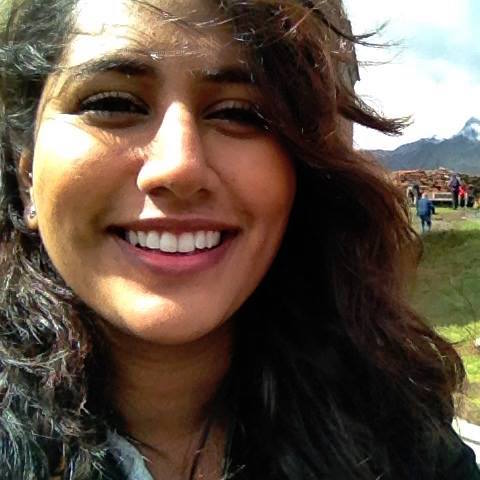
Oasis For Girls is turning 18 this year, but today we are celebrating a very special Oasis girl’s 31st! Sadaf Minapara was part of the original Oasis cohort in 1999, attending Mission High School in San Francisco and living in Columbia Heights, and came back to us as a board member last fall.
Birthdays are a time of reflection for many of us, and she said that looking back, she found that Oasis was behind many of her personal and professional accomplishments. “Oasis is my giving tree,” she laughs, “When I was a young girl, it was a safe space to learn, question, and focus on myself. Now I’m coming back with the hopes of giving back to the community that shaped me and learning a different set of leadership skills.”
Both Sadaf and Oasis have grown up in the meantime. She went on to UC Berkeley, double majoring in Political Science and South and Southeast Asian Studies; opened her own floral business, Baynisa Blooms; and is currently a Program Manager at Stanford University’s Center on Democracy, Development, and Rule of Law. Oasis has expanded from one program to three, each fostering different critical aspects of girls’ development as socially conscious, empowered women with the academic and career tools to achieve their dreams.
“Most of the girls I grew up with had to deal with traditional cultural values at home and the realities of being a young woman in a city like San Francisco,” Sadaf says, “This is a key part of what it means to be a young person of color, and the daughter of immigrants; that isn’t going to change.” At Oasis, girls have a valuable middle space to focus on themselves and the women they want to be, celebrating their roots and actively engaging in shaping the city they call home.
Community is important at Oasis—the community of girls, the neighborhoods they live in, their family circles, and their city. Coming back home to San Francisco, Sadaf says she looked for something to support in a meaningful way. “Many people donate to big causes or organizations on a national or international scale, but change really starts at home, and a lot of the policies and attitudes that need changing impact people in very real ways in our communities. If you put it into those terms, the reality is that you’re getting the most for your investment in smaller community-based organizations that create lasting ripples of change.”
For Sadaf, leading the charge for the younger generation of girls like herself was doubly important in our current climate. “We talk a lot about women in tech here, but wherever Oasis girls go, they will need a strong sense of self, understanding of social justice and womanhood, leadership skills, and a sense of community. We need girls like them to speak up and demand better, and they learn to do that at Oasis.”
This year, Sadaf is asking for birthday donations to Oasis in lieu of (or in addition to!) any gifts. Please celebrate Sadaf with us! Put your birthday wishes in the comments, and show your love here.
Back to Top

